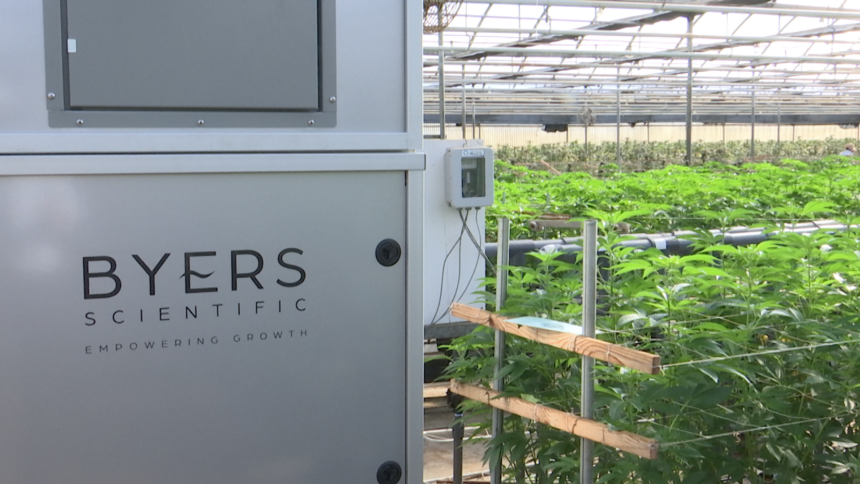New technology could help Carpinteria cannabis growers clear the air

CARPINTERIA, Calif. - As the stubborn smell of cannabis fills the Carpinteria Valley air, so does tension between growers and neighbors.
The ongoing concern over cannabis odor in the area could be improved, however, thanks to a new filtration system being installed at one local farm, first reported by journalist Melinda Burns.
Cindy and David Van Wingerden own CVW Organic Farms, which has been a Carpinteria Valley staple for decades. Cindy and David have been growing cannabis on the farm for five years.
They have been reaching out to neighbors and the community at large to try to work through the odor issue.
“Our neighbors, they have legitimate concerns,” David said. “Everyone deserves to live in a community where there’s no odor.”
Like most growers in Carpinteria, the Van Wingerdens use a vapor system on their cannabis greenhouse that releases essential plant oils along the side vents.
The vapor dilutes the cannabis odor released through the vents, though the system can be overwhelmed at times.
“The odor starts building up in the greenhouse at night, and so it’s what we call a little ‘burp’ that we experience in the morning as those vents and those blackouts are opening,” David said.
Large, advanced carbon "scrubbers" could be the solution. They are designed to filter the air and reduce odor buildup inside greenhouses, on a larger scale than current carbon filtration systems on the market.
The technology has been used to reduce odor in cannabis processing areas, but installing them in greenhouses where plants are cultivated could help solve the Valley's permeating odor problem.
“The carbon scrubbers will help reduce that odor as the blackouts and the vents are still closed, so that when they do open, it’ll be much less impact on the air flowing out of the greenhouse,” David said.
The scrubbers are installed by Byers Scientific, a company that modified the original design from Swedish company Camfil.
“There’s nothing like this in North America,” company founder and owner Marc Byers said. “With our science, we developed really the number of exchanges that’s necessary where you can say you’re actually scrubbing the air, or exchanging the air, at a rate about equal to which the plants produce it.
“The nose is the ultimate metric, but we need to put data behind it.”
The company did just that. According to Byers, a recent test in a local cultivation greenhouse environment found that the scrubbers reduced the number of terpenes--the hydrocarbons produced by plants--in the air by an average of 96 percent.
"Installing the appropriate number of these, there's no reason that we don't really conquer this odor problem in the Valley," Byers said. "Notwithstanding, everyone also following standard operating procedures."
The Van Wingerdens plan to have eight of the scrubbers installed in their greenhouse in the next six months. Each grow will need a different number of scrubbers depending on its size and characteristics.
Byers says he considers the product affordable, but financial and electrical constraints (each scrubber needs four amps to run) could slow industry-wide adoption.
The Santa Barbara County Planning Commission will be watching the results from the Van Wingerdens' farm over the coming months.
“It’s been a long time coming,” said County Planning Commissioner Michael Cooney, who represents the First District. “And there are several growers, quite a few, that have inadequate technology in place now… This [plan] is the best chance we’ve had and I’m optimistic.
"We want to get back to that place where agriculture and residential ownership can coexist."
Cooney lauded the Van Wingerdens for "going further than most any other" odor management project that has come before the County Planning Commission. He did acknowledge that the jury is still out on just how effective these scrubbers can be.
"There are conditions attached to the project that would require [the Van Wingerdens] to do more if they are not successful with controlling the odor with the current technology they proposed," he said. "So, it's kind of 'Good now, but show me in a year or two it's still the best technology.'"
David Van Wingerden, while also encouraged by the scrubbers, says they likely won't be the final step toward eliminating cannabis odor.
“It’s always going to evolve,” he said. “There’s always going to be improvements that the industry can make.”
